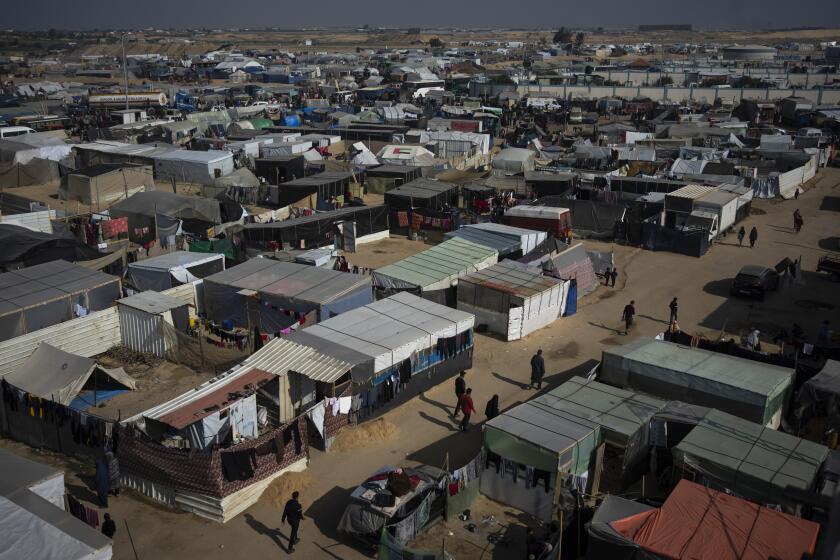There Still May Be a Chance Before Ground War Starts : Keep diplomatic doors open; they might lead to options U.S. can accept
The details of the Soviet Union’s proposals to get Iraq out of Kuwait remain obscure. President Bush’s reaction to the plan as far short of satisfying U.N. Security Council resolutions sounds emphatic, but it still leaves room to maneuver. That’s important, because this may be the last chance for a diplomatic resolution before the Persian Gulf War becomes a bloody slugfest in the sand that could be prolonged and involve heavy casualties.
At Moscow’s request, Bush didn’t disclose details of Soviet President Mikhail Gorbachev’s peace plan. But although Bush said Tuesday that “there will be no concessions, nothing to give” in dealing with Iraq, it is noteworthy that the President didn’t reject the Soviet proposal outright. Instead, Bush said he told Gorbachev his peace plan “falls well short of what would be required” to end the war. That clearly implies the peace plan could be made acceptable. In other words, although Bush sounds tough, it could be the kind of tough talk used in the early stages of hardball bargaining.
For their part, the Soviets did not take Bush statements as a “no,” so their proposal is likely to stay on the table awhile. Soviet diplomats continue to insist that Saddam Hussein would accept Gorbachev’s proposal that Iraq withdraw unconditionally from Kuwait as long as Moscow promises to assure Iraq’s political survival and to work toward settling long-simmering Middle East disputes. Iranian diplomats have also repeatedly said Iraq is ready for an unconditional withdrawal, but that Saddam wants to negotiate the pullout, despite the fact that U.N. Resolution 660 explicitly states that Iraq must withdraw “immediately and unconditionally.”
All this diplomacy, however, may do no more than postpone the moment--already being talked of in the allied camp as imminent--when members of the U.S.-led coalition launch their ground offensive into Kuwait.
That is the moment Saddam Hussein has been asking for, and he has been open about his reasons. As he told this country’s ambassador to Iraq last July, he is convinced that American public opinion will refuse to accept heavy combat casualties, that as soon as battlefield deaths begin to rise, popular pressure will force Bush to seek a negotiated settlement. At that point, Hussein believes, he will have won a political victory, however great the human and material costs to Iraq. Of course, that doesn’t jibe with public opinion polls that indicate Americans would support even a bloody ground war to free Kuwait, and many believe Hussein must be utterly defeated and overthrown to ensure lasting peace in the Gulf.
Yet while a land war might now be the only way to liberate Kuwait, we must not rush into it prematurely.
The first five weeks of battle have seen Iraq’s war-fighting capabilities deeply eroded. Command and communications facilities have been smashed, munitions and fuel dumps blown up, armor and artillery destroyed, troops in the field bombarded mercilessly. While this has not been a cost-free operation for the allies, neither has it been cost-free for Iraqi civilians, hundreds, perhaps thousands of whom have been tragically killed in the bombing. But casualties--allied, Iraqi and Kuwaiti--threaten to be vastly larger once a ground war starts, especially if it is launched sooner than it need be.
President Bush has promised that the effort to liberate Kuwait won’t be another Vietnam. But Kuwait’s real analogy isn’t with Vietnam. The struggle for Kuwait, if fought on Iraq’s terms, could instead much more closely approximate some of the gory World War II island battles fought by U.S. troops against deeply entrenched Japanese forces--the battle for Okinawa, say, where 12,000 Americans were killed in action and 36,000 were wounded. That, everyone agrees, should be avoided. But how?
By sustaining the air war, wearing down Iraq’s ability to fight--military briefers say up to 200 tanks a day are now being demolished--and applying constant pressure to demoralize its troops. For how long? As long as practical and political considerations allow.
The weather is one limiting factor because dust storms and the coming heat help dictate the nature and timing of a land war. Morale is another because an army ready to go loses some of its fighting edge if it remains idle. Politics is a third because the longer the conflict awaits a conclusion the greater the chances that international support for it will slacken.
All these calculations must be factored into the equation. But the biggest calculation of all is still the imperative to keep American and other allied casualties as low as possible. Saddam Hussein’s final hope is to lure the coalition into a war of attrition on the ground. Far better for now to let whatever attrition there must be continue to come from the air, in unsparing attacks to grind down his army’s ability to fight.
And that also provides more time for any final diplomatic initiatives to be played out.
More to Read
Sign up for Essential California
The most important California stories and recommendations in your inbox every morning.
You may occasionally receive promotional content from the Los Angeles Times.






